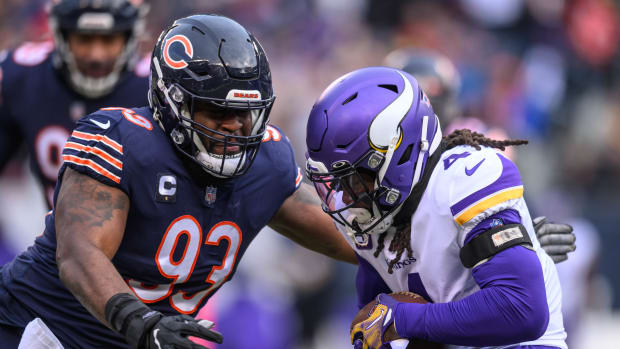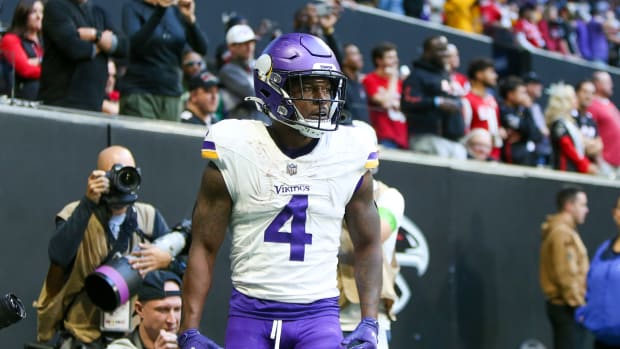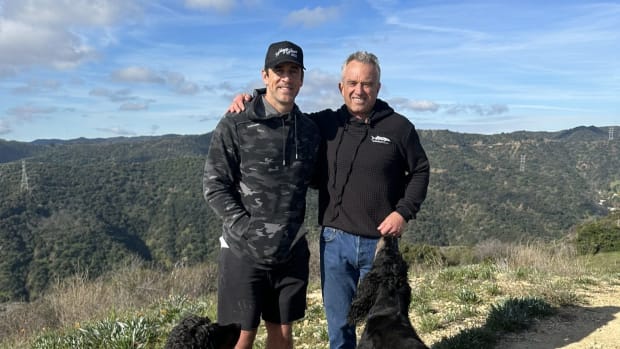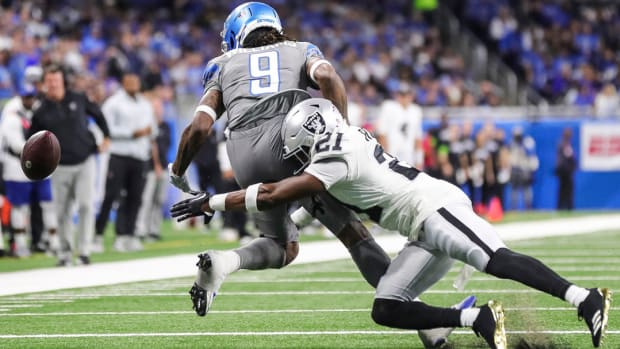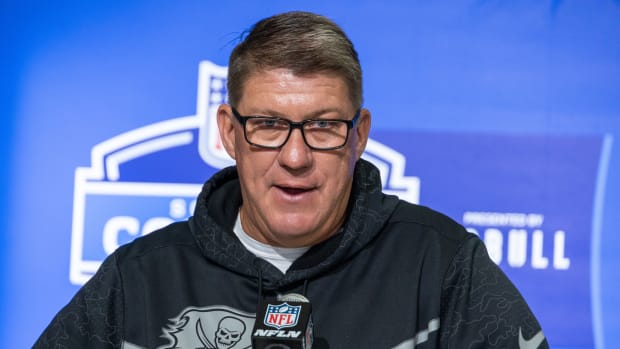Can the NFL escape the depths of its own corruption?
Your teams on the go or at home. Personalize SI with our new App. Install on iOS or Android.
In 1924, a Philadelphia lawyer named Owen Roberts was hired by Congress to look into the rapidly blossoming Teapot Dome Scandal. Not long after he took the job, one senator pulled Roberts aside and cautioned him not to rely on a certain important government official, whom the senator said was hip-deep in the thickly deepening muck. That official was the incumbent Attorney General of the United States, a crook named Harry Daugherty. The senator told Roberts:
I wouldn't depend on the Justice Department for investigative purposes, nor would I approach the Attorney General's office for information if I were you…It is my conviction that the man would go to any lengths to protect himself and his friends—and make no mistake about it, the people we are after are friends of the Attorney General. Harry Daugherty has had a hand in every dirty piece of business that has come out of the Harding administration. There is every reason to believe that, at the very least, Daugherty is one of the men who knows the whole sordid story of the oil leases—and there is enough evidence to warrant the suspicion that he himself might have profited from them. In addition, the Department of Justice and its Bureau of Investigation are hand-picked by Daugherty and rotten to the core.
It’s time to finally move on from the circus that is Deflategate
Sometimes, the corruption in an institution is so deep and so thoroughgoing that it becomes the life force of the institution. It is more than the cost of doing business. It is itself the business that is being done. Sometimes, the corruption in an institution is so positively endemic that it makes a sad mockery of Juvenal’s ancient warning—Quis custodiet ipsos custodes? (Who guards the guards themselves?)—and Juvenal was a satirist by trade. But neither he nor Owen Roberts lived long enough to confront the writhing ball of snakes that is the National Football League.
Put simply, the NFL has forfeited its credibility on just about any issue within an area code of morals and ethics. Its sense of civic responsibility has atrophied to almost nothing, and its public conscience is largely vestigial. The simple act of playing the game has been revealed as being so fundamentally destructive to the human organism that it now is impossible to believe that, if we knew then what we know now, the game ever would have been invented at all, let alone that children ever would have been allowed to play it.
In an attempt to soft-pedal this evermore stark reality, the NFL has torn up the language. In an attempt to duck responsibility for the health and safety of its most visible employees, the NFL has cooked its own books and used for its own purposes people whose earlier gigs included helping the tobacco industry try to get out from under five decades of negligent homicides. And now it seems that the NFL’s corruption has managed to infect the government of the United States.
A congressional report released last week charged that, after shoveling tens of millions of dollars to the National Institutes of Health for the purpose of researching the effects of concussions, the NFL then sought to rig the research, and to direct some of the money to a doctor who was connected to the league. A congressman named Frank Pallone from New Jersey left every word unminced:
"The N.F.L.’s troublesome interactions with the N.I.H. fit a longstanding pattern of attempts to influence scientific understanding of degenerative diseases and sports-related head trauma,” Mr. Pallone said in a statement. “The N.F.L. must recognize the importance of this ongoing, impartial research, and live up to its funding commitments to N.I.H."
It’s clearly time for other, more serious institutions to start treating the NFL like a rogue operation unworthy of their trust. Congress already is looking cockeyed at it. No respectable medical researcher should sully his scrub suit with the league’s money. Every respectable scientist should look at the NFL the way that they study a new bacillus. Nobody ever again should trust in the league’s good faith in this area.
It’s pure hubris, born of the knowledge that, ever since the 1960’s, when every play-by-play man in every broadcast booth smoked like Cleveland in the summer, the NFL was the central force of gravity in the American sports-entertainment universe. It entwined itself with all the other centers of power in American society so tightly that it became one of them. It allied itself with the corporate class. It romanced the politicians who were easily romanced themselves by the corporate class. The owner’s box at, say, a Washington Redskins game at the old RFK stadium was an incestuous power-gaggle that belonged in a Russian novel or a Byzantine brothel.
It looked very much like this luxurious, cozy arrangement would last forever. And then players began to get lost coming home from the grocery store. And then players began to kill themselves.
Week Under Review: NFL teams should stay far away from Art Briles
There was a time in which the NFL might have been able to get ahead of this story. The league's administration certainly had a moral obligation to do so. After all, this wasn’t burying some players who got caught buying weed, and it wasn’t peddling influence to sucker some rubes into footing the bill for a new stadium. This was a workplace-safety issue that, handled correctly, would have gone a long way toward allaying the suspicion that the NFL looked at its players as just so many disposable commodities. This was a chance for the NFL to re-model itself for the 21st century.
Instead, the NFL denied the momentum of the science, over and over again, until that momentum became overwhelming and the league responded by trying to monkey-wrench the science. It got caught once, and got caught again. And then, as it pursued a pathetic case against the New England Patriots concerning the amount of air in a football, it dodged the question while former players vanished into an internal fog.
Its commissioner, Roger Goodell, has been worse than incapable of handling the crisis. He’s actively constructed a Potemkin village of concern around it, an edifice of denial and deceit that is now crumbling inevitably to dust. The members of Congress don’t appreciate being hornswoggled by obvious incompetents; they see enough of that among their colleagues. Cutting-edge research scientists, the ones with intact ethical compasses anyway, don’t like getting hockled in their work by glorified marketing geniuses. I think the commissioner and his spin apparatus have messed with the wrong people this time around.
• VRENTAS: The NFL and the business of concussion research
If you’re going to run a multimillion-dollar enterprise that carries the kind of personal risk to its participants without which professional American football as we know it cannot exist, you have to run it with nearly complete medical and legal transparency. There is an implicit requirement of what the research community calls “informed consent” that’s in play here. Back in the bad old Olympiads, when the East German medical establishments were pumping their country’s athletes full of whatever potions happened to be on the shelves that day, the worst of those crimes was the fact that the athletes never were told honestly what was being done to their body chemistry. In February of 2015, a former East German track star named Ines Geipel went public with her story of being doped up under the tender supervision of the Stasi, the dreaded East German secret police. The results were long-lasting and completely dreadful.
Women developed cancers and intense pain that led to morphine addictions. Birth defects among children became common. Combining East and West, 30 athletes have died young. And Geipel, who now heads the Doping Victims Assistance Organization, believes it’s not just Germany that has yet to learn the lesson. Governments around the world, she says, put the same overblown value on sport victory as East Germany did and turn a blind eye to drug use by athletes to attain that glory. “The dreams of glory and medals ignore the army of those who will die young, or suffer for life,” she said. “The story in East Germany was of external coercion to take the drugs. The story today is of external and internal pressure. But the results are the same – medals and ruined lives.”
The difference between what the East German officials did to their athletes, and the NFL’s stonewalling on what it knew to be the truth about what repeated concussions were doing to its players, is a difference of moral degree, but not of moral kind. If you are profiting personally from the damage inflicted on the people earning you your money, and if you’re lying to them about the nature and extent of the damage, you’re pretty much a vampire and should be shamed from the company of decent people. Quis custodiet ipsos custodes? That’s the funniest thing Juvenal ever wrote and it’s too bad he didn’t live long enough to see how funny it really is.
































